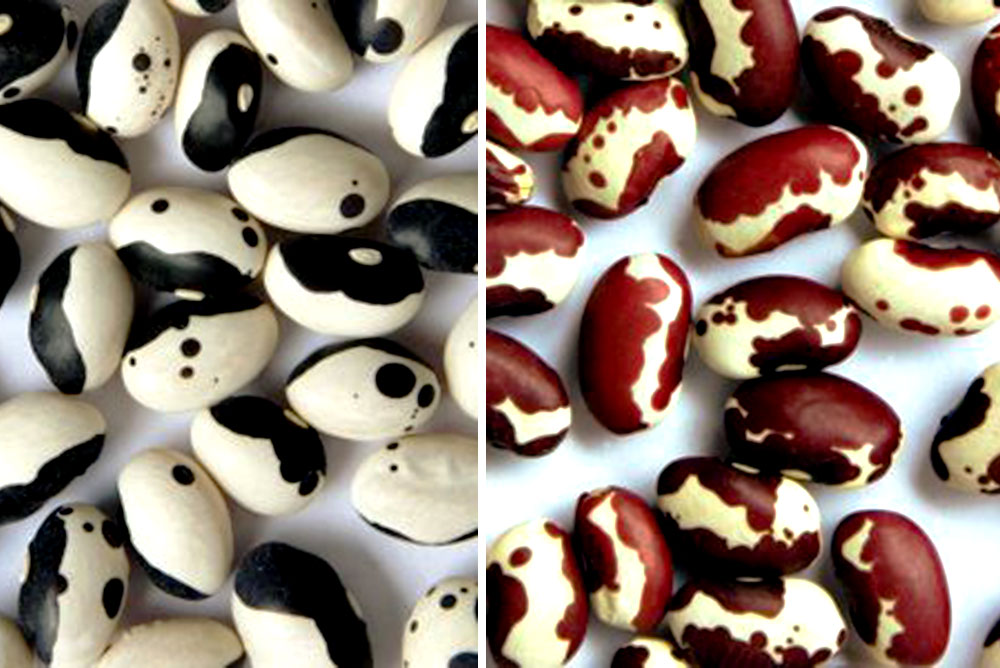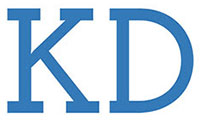
From Zursun Beans, left, heirloom Calypso beans (also called Yin/Yang beans) have a distinct potato flavor. Right, Anasazi beans, which can be used to substitute for pinto beans.
By Nancy Pollard
After owning one of the best cooking stores in the US for 47 years—La Cuisine in Alexandria, Virginia—Nancy Pollard writes Kitchen Detail, a blog about food in all its aspects—recipes, film, books, travel, superior sources, and food-related issues.
 BACK WHEN I ran my La Cuisine cookware shop, we Cuisinettes had the brainstorm that we would become a hotbed of beans, both in the shop and online. But not just any old bags o’ beans drying out on grocery shelves. Nope. We had in mind the gorgeous morsels grown by small independent farmers under the aegis of Zursun—Zursun beans. I discovered Lola Weyman, who founded the company in 1985, when a chef at Jean-Louis Palladin’s restaurant in DC told me they bought most of their beans from her. A tip like that is a culinary gold nugget.
BACK WHEN I ran my La Cuisine cookware shop, we Cuisinettes had the brainstorm that we would become a hotbed of beans, both in the shop and online. But not just any old bags o’ beans drying out on grocery shelves. Nope. We had in mind the gorgeous morsels grown by small independent farmers under the aegis of Zursun—Zursun beans. I discovered Lola Weyman, who founded the company in 1985, when a chef at Jean-Louis Palladin’s restaurant in DC told me they bought most of their beans from her. A tip like that is a culinary gold nugget.
Lola’s company was the first to offer authentic US-grown heirloom beans, all nurtured on small family farms in locales including the Snake River Canyon region, known as the Magic Valley Growing Area. This spot’s arid climate; rich, well-drained, loamy soil; moderate temperatures; and stable moisture level have made it internationally recognized as environmentally ideal for bean-growing. We converted many a bean-tolerater into a bean-lover, as many of our customers will attest, because Zursun beans are heaps better than what you can purchase at most grocery stores.
A Little Helping of Zursun Beans History
In Idaho, home to verdant fields of lentils known as the Palouse (from the French word pelouse, meaning “green lawn”), Zursun founder Lola Weyman found several farmers growing unknown lentil varieties. During the late 1980s, Lola began distributing American-grown lentils, to US, Canadian, and European customers. Lola also helped develop new lentil varieties, like Montana’s Black Beluga, named for its resemblance to caviar; Petite Crimson, smaller and quicker-cooking than the standard Red Chief; and an American version of Lentilles du Puy.
Jim Soran, with 60 years of family roots in the Idaho bean industry, acquired Zursun in 2004. Under his guidance, and with the skills of 300 independent farmers who grow beans for him, Zursun heirloom beans are continually inspected during the growing season for plant health, pure strains, and consistent appearance. Jim’s passionate focus on producing the best-quality beans ensures Zursun Idaho Heirloom Beans are fresh and beautifully cleaned and milled. When the harvest is sold out, as La Cuisine customers found out, you wait until the next one. There was never an unending supply, as there is from other purveyors.
Little Known Facts About Zursun Beans
One of the most interesting facts I learned from Jim was that beans and other similar legumes do not have to be bought from organic sources, (and they do grow some certified organic bean crops) as the “seed” matures inside the pods of the plants and not in the actual soil. The pod provides protection that flowering seed plants like tomatoes and squashes don’t enjoy. Generally, crop rotation rather than pesticides is used on these farms, because there is a low level of insects in this area of Western Idaho. An even greater plus is that Roundup weed killer is not used; soybeans are the main recipient of Roundup—and no soybeans are grown under Zursun.
Since we have closed the shop, Karla Hartzell at Zursun has developed an online platform for purchasing their beans. My preference is to order them in boxes of six ba gs (they can be mixed), as that is how they were packed for the shop. When you get your box, each bean type has a tasty and well-tested recipe on the back of the bag. The Cuisinettes know how good those recipes are, because we’ve made most of them ourselves. Drive yourself crazy choosing which gorgeous beans to have packed in those cartons of six bags. The site also offers you a listing of local vendors that carry their beans.
gs (they can be mixed), as that is how they were packed for the shop. When you get your box, each bean type has a tasty and well-tested recipe on the back of the bag. The Cuisinettes know how good those recipes are, because we’ve made most of them ourselves. Drive yourself crazy choosing which gorgeous beans to have packed in those cartons of six bags. The site also offers you a listing of local vendors that carry their beans.


